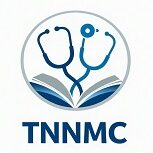The healthcare landscape in 2025 continues its significant transformation, with remote work solidifying its place as a vital component of nursing practice. Driven by evolving healthcare delivery models and the sustained demand for virtual care, a diverse array of remote nursing positions has emerged, offering nurses unprecedented flexibility and new avenues to apply their expertise. This guide provides an overview of the remote nursing job market in 2025, detailing the types of roles available, the necessary qualifications, and the career opportunities within this dynamic field.
The Expanding Realm of Telehealth and Virtual Care
The growth of telemedicine has been a primary catalyst for the rise of remote nursing. Market analyses consistently show robust expansion, although specific figures may vary. For instance, while one report projected the U.S. telemedicine market to reach approximately USD 94.3 billion in 2025 with growth towards USD 395.6 billion by 2034 (CAGR 17.3%), another estimated a 2025 size of USD 41.54 billion heading towards USD 160.45 billion by 2034 (CAGR 16.2%). Regardless of the precise valuation, the trend is undeniable: telehealth adoption is surging, underscoring its increasing importance in healthcare delivery.
Several key trends shape the telehealth environment in 2025:
- Hybrid Care Models: Integrating virtual consultations and monitoring with necessary in-person visits is becoming standard practice.
- AI Integration: Artificial intelligence is enhancing diagnostic support, workflow automation, and personalization within telehealth platforms.
- Interoperability: Improved connections between telehealth systems and Electronic Health Records (EHRs) streamline data flow and care coordination.
- Specialization: Telehealth services are increasingly tailored to specific medical fields, from tele-ICU to tele-psychiatry.
- Cybersecurity: A heightened focus on robust security measures protects sensitive patient data in the virtual space.
The COVID-19 pandemic dramatically accelerated this shift, boosting telehealth usage significantly from its pre-pandemic baseline in the initial phases. While usage rates have normalized somewhat, they remain substantially elevated. Widespread acceptance bolster this sustained adoption: surveys indicate a vast majority of patients (around 82%) and healthcare providers (around 83%) favor hybrid care models, with a substantial portion of consumers (nearly 40%) planning continued telehealth use.
This digital transformation has directly fueled the demand for nurses skilled in virtual care delivery, creating a wide spectrum of remote nursing opportunities across various specialties.
Diverse Opportunities in Remote Nursing
The proliferation of telehealth has opened numerous avenues for nurses to leverage their skills remotely. Understanding the different types of roles available is the first step for nurses considering a transition to virtual healthcare.
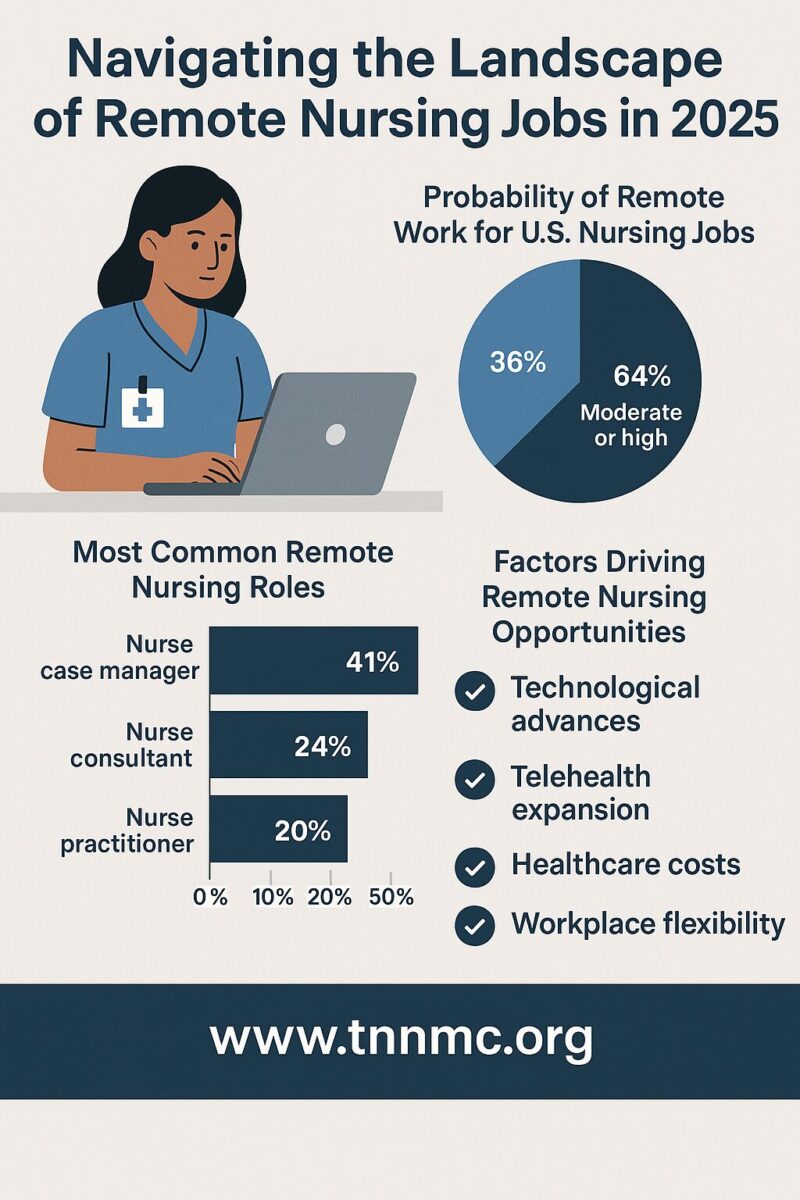
Exploring Key Remote Nursing Roles
(Note: Salary ranges are based on aggregated data reported for 2025 and can vary significantly based on location, experience, certifications, employer, and specific responsibilities. Always consult direct employer postings and reputable salary databases for the most current information.)
1. Telehealth Nurse
- Primary Responsibilities: Provide direct nursing care remotely using technology (video, phone, remote monitoring devices). Conduct virtual consultations, assess patient symptoms, offer patient education, manage chronic conditions, and provide urgent care guidance. Utilize clinical algorithms and protocols for assessment and care planning.
- Typical Education & Experience: Active RN license required. BSN often preferred or required. Minimum 2-3 years of clinical experience, often in ambulatory care or a relevant specialty (approx. 2,000 hours in past 3 years sometimes cited). Experience with telehealth platforms is advantageous. Certification (e.g., Ambulatory Care Nursing Certification, AMB-BC) enhances credentials.
- Reported 2025 Salary Ranges: Average salaries show significant variation. Reported averages range from ~$60,926 (range $44k-$82k) to ~$96,730 (range $89k-$108k), with some sources indicating hourly rates averaging near $89 (range $40-$120).
- Career Outlook & Advancement: Strong growth expected. Opportunities to specialize (tele-ICU, tele-oncology), or move into roles like patient navigator or care coordinator.
- Example Tasks: Conducting video calls for post-surgical wound checks, remotely monitoring vital signs for chronic heart failure patients, providing telephone triage for acute symptoms, educating diabetic patients on self-management via virtual sessions.
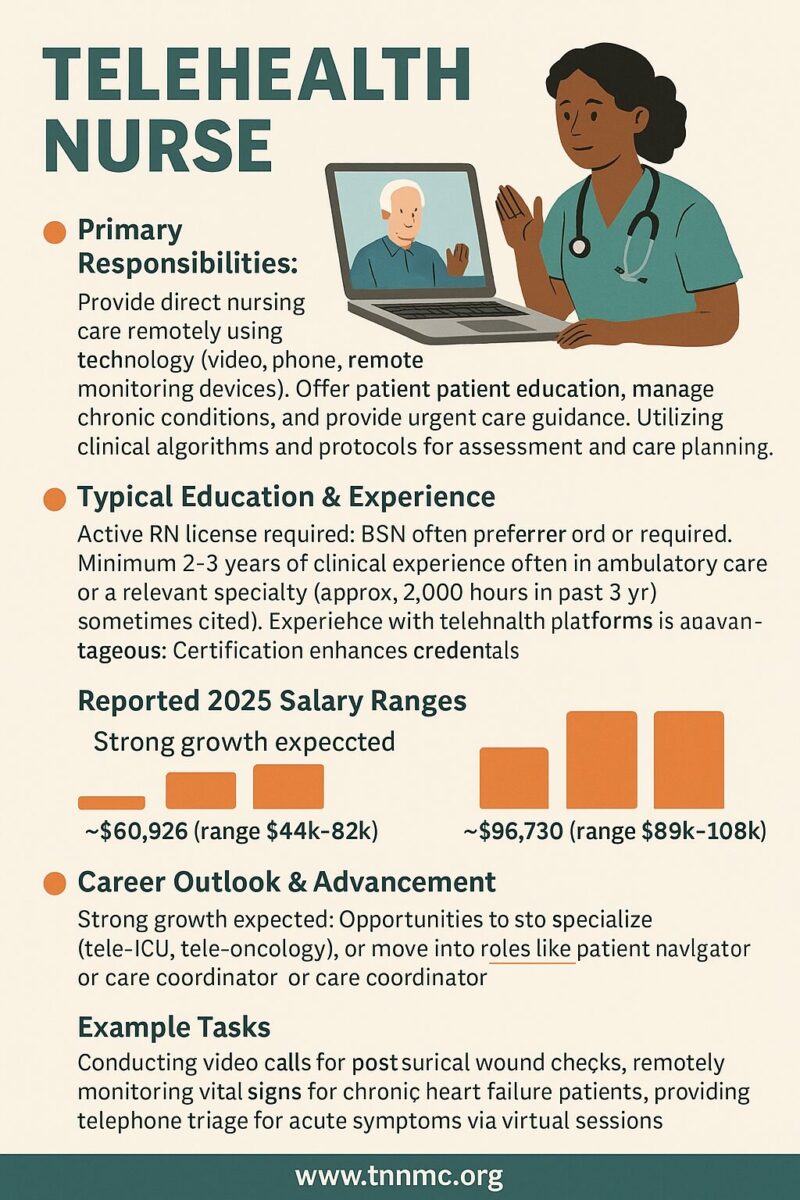
2. Remote Nurse Case Manager
- Primary Responsibilities: Coordinate comprehensive care plans for patients, especially those with complex or chronic conditions. Conduct holistic assessments (medical and psychosocial needs), collaborate with healthcare teams and insurance companies, connect patients with resources, advocate for patient needs, and monitor outcomes.
- Typical Education & Experience: An active RN license is required; a BSN or MSN is often preferred. Several years (often 3-5+) of clinical experience in settings like hospitals or community health are also required. Certification in case management (e.g., CCM, CMGT-BC) is highly valued and often preferred/required.
- Reported 2025 Salary Ranges: Reported annual averages hover around $97,500 – $98,800, with common ranges spanning from ~$89,000 to ~$107,500 (or $73,500 to $119,500 according to another source). Average hourly rate reported around $47.53.
- Career Outlook & Advancement: High demand due to aging population and chronic disease prevalence. Advancement includes specialization (oncology, geriatrics), leadership roles, or pursuing NP or healthcare administration degrees.
- Example Tasks: Developing a long-term care plan for a stroke survivor, coordinating services between specialists for a patient with multiple chronic illnesses, connecting a homeless patient with housing and healthcare resources, advocating with insurers for necessary medical equipment.
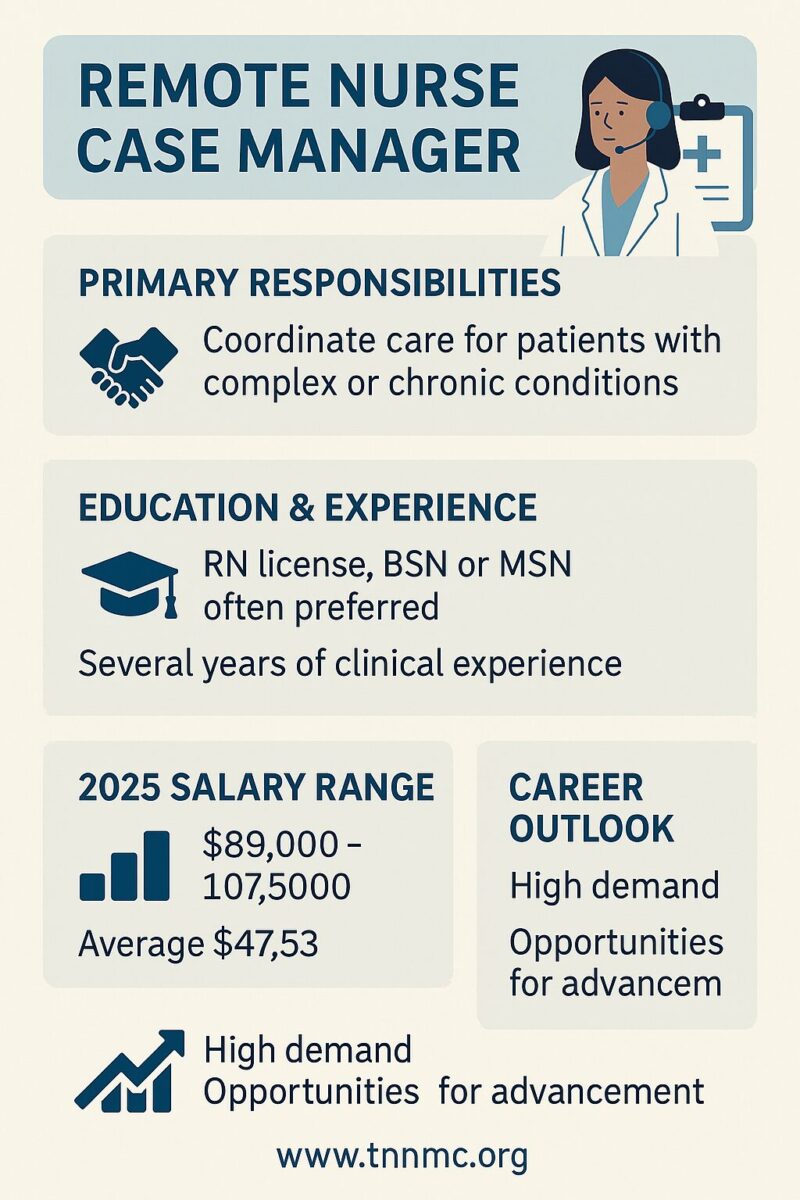
3. Utilization Review Nurse
- Primary Responsibilities: Review patient medical records and treatment plans to determine the medical necessity, appropriateness, and cost-effectiveness of healthcare services. Apply established criteria and guidelines, liaise with physicians and insurance providers, and make decisions on service approvals. Conduct prospective, concurrent, or retrospective reviews.
- Typical Education & Experience: Active RN license required; ADN acceptable, but BSN often preferred. Typically requires 2-3 years of clinical experience, often in acute care. Certifications like CMGT-BC or in Healthcare Quality and Management (HCQM) are beneficial.
- Reported 2025 Salary Ranges: Reported annual averages range from ~$76,762 (range $61k-$95k) to ~$87,946 (range $69.5k-$101k). Average hourly rate reported around $42.28.
- Career Outlook & Advancement: Strong outlook due to focus on cost-effective care. Advancement opportunities exist in case management, care transition coordination, or roles like clinical documentation improvement (CDI) specialist.
- Example Tasks: Reviewing a request for an extended hospital stay against insurance criteria, discussing alternative treatment options with a physician to ensure cost-effectiveness, appealing an insurance denial for a specific procedure, ensuring documentation supports medical necessity.
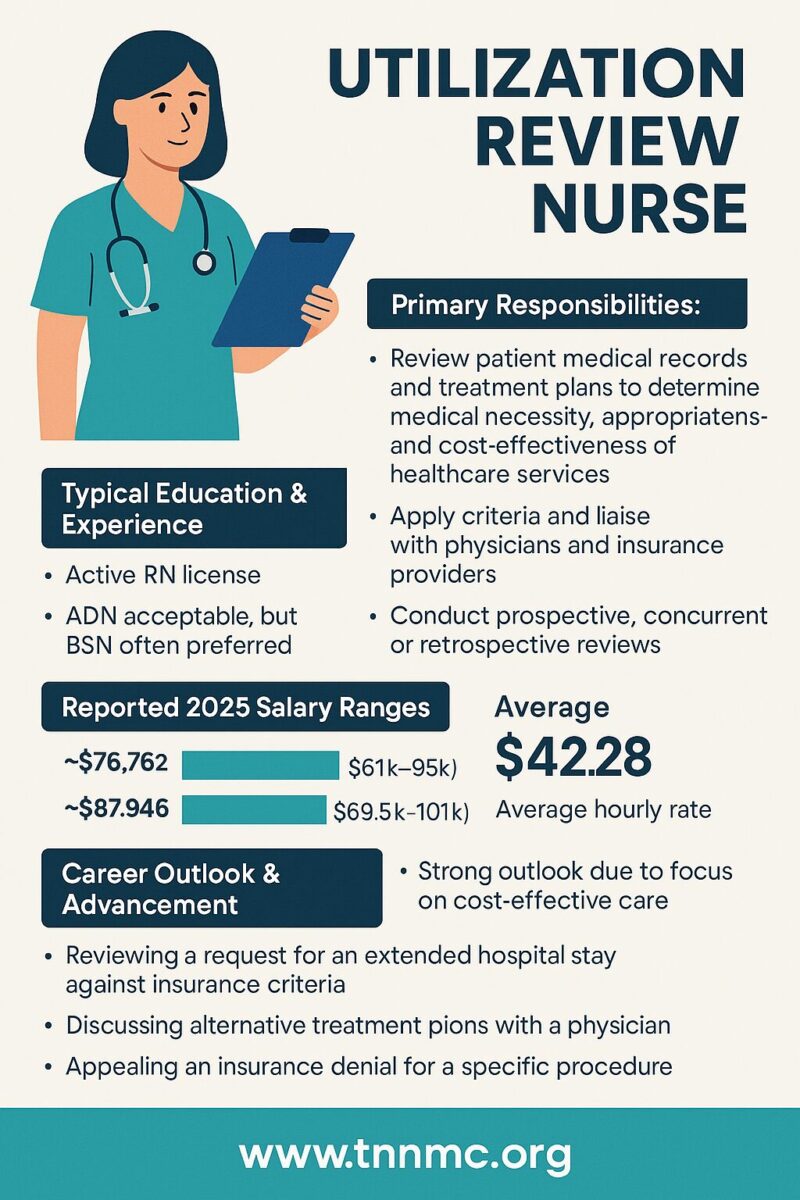
4. Telephone Triage Nurse
- Primary Responsibilities: Assess patient symptoms and health concerns via phone or video to determine urgency and direct them to the appropriate level of care. Provide medical advice, answer health questions, and offer self-care instructions using established protocols and algorithms. May schedule appointments or make referrals.
- Typical Education & Experience: Active RN license required; BSN often preferred. Typically needs 2-3 years of clinical RN experience, preferably in urgent care, emergency, or ambulatory settings. Certification (e.g., AMB-BC) is advantageous.
- Reported 2025 Salary Ranges: Reported average annual salaries range from ~$79,160 (range $50.5k-$94.5k) to ~$88,840 (range $81k-$99.5k). Average hourly rate reported around $38.06.
- Career Outlook & Advancement: Positive outlook with telehealth growth (projected overall RN growth ~6% 2022-2032). Opportunities include specializing, supervising triage teams, or moving into quality improvement roles.
- Example Tasks: Assessing a parent’s description of a child’s fever over the phone to advise on home care vs. ER visit, using protocols to evaluate a caller reporting chest pain, providing instructions for managing minor injuries remotely, answering questions about medication side effects.
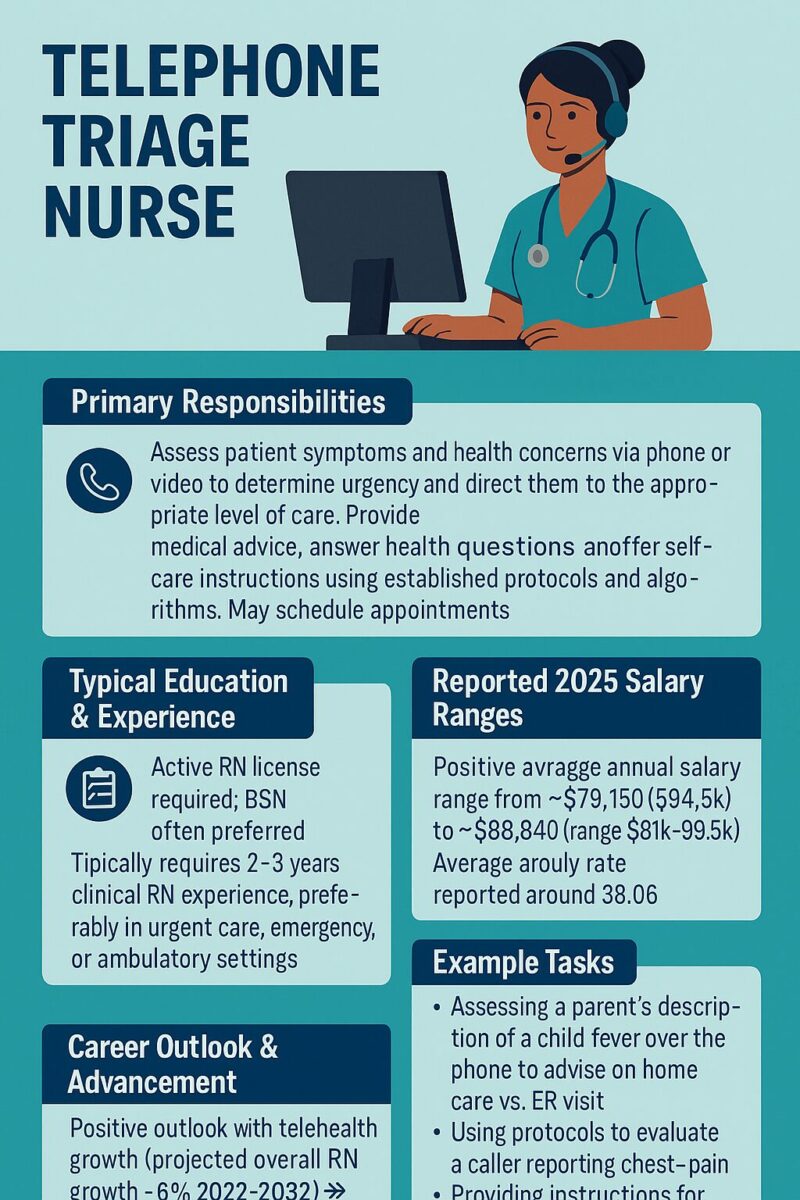
5. Remote Nurse Educator
- Primary Responsibilities: Design, deliver, and evaluate nursing education programs or clinical staff training using virtual platforms. Develop curricula, conduct online lectures/discussions, mentor students or nurses, assess learning, and contribute to policy development. May specialize in academic or clinical education.
- Typical Education & Experience: Active RN license required. BSN minimum; MSN or doctorate (Ph.D., DNP, Ed.D.) often required for academic positions or higher-level roles. Requires significant clinical experience (typically 3-5+ years). Certification as a Nurse Educator (CNE) is often preferred/required.
- Reported 2025 Salary Ranges: Reported average annual salaries are around $96,460 (clinical, range $75k-$120k) to $102,263 (remote, range $72k-$123k). Varies greatly by academic vs. clinical setting, degree level, and institution.
- Career Outlook & Advancement: Very strong outlook due to nursing faculty shortages and ongoing need for clinical training (projected growth for postsecondary health teachers ~18% through 2033 cited). Advancement includes roles like professor, dean, program director, curriculum specialist, or educational consultant.
- Example Tasks: Delivering an online lecture on pharmacology to nursing students, developing virtual simulation scenarios for clinical skills training, mentoring new graduate nurses remotely, creating continuing education modules for hospital staff on new EMR features, potentially offering virtual NCLEX prep.
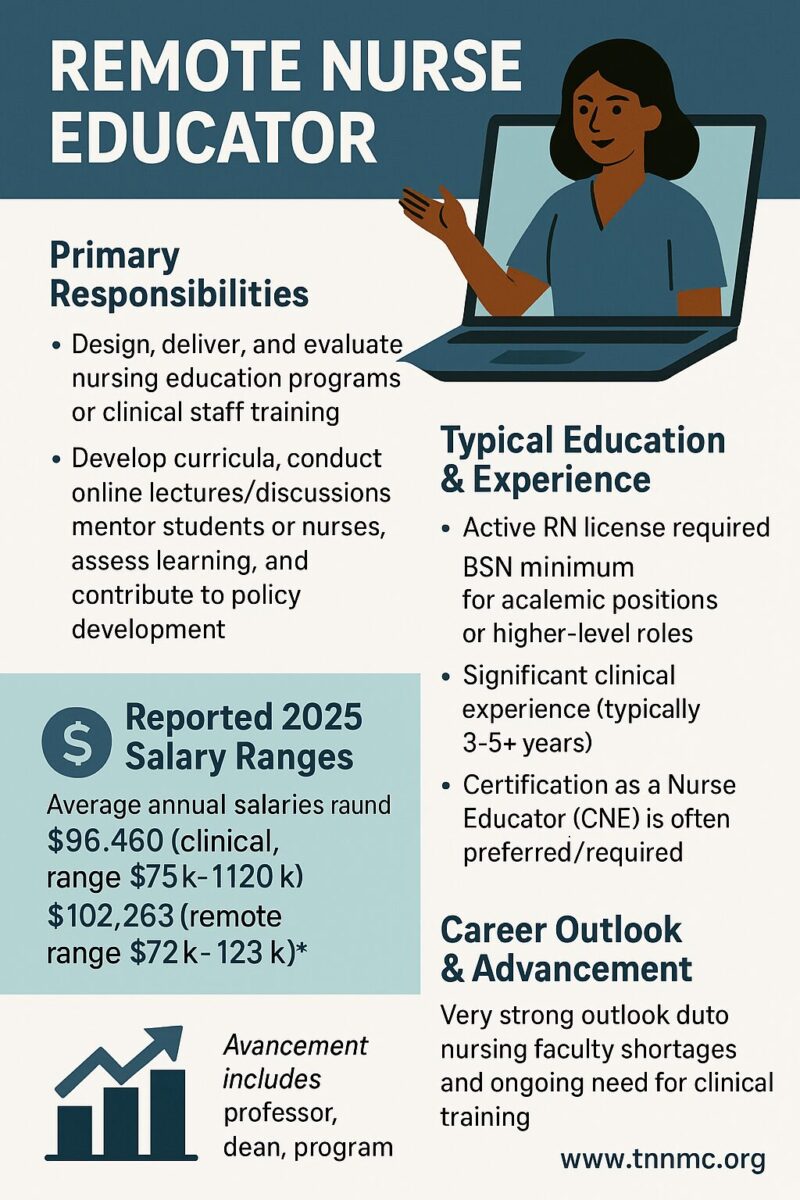
6. Remote Health Coach
- Primary Responsibilities: Partner with clients (patients) virtually to facilitate self-directed health behavior changes. Help clients set wellness goals (diet, exercise, stress management, chronic disease management), develop action plans, provide support and accountability, and educate on healthy lifestyles using evidence-based dialogue.
- Typical Education & Experience: Active RN license required. While not always mandatory, specific health coach training and certification (e.g., through AHNCC or NSHC) are highly recommended and often preferred. Clinical nursing experience provides valuable background.
- Reported 2025 Salary Ranges: Reported average annual salaries are around $48,790 (range $37.5k-$57.5k). Average hourly rate reported around $23.46. Can vary based on certification, experience, and employment setting (corporate wellness, insurance, private practice).
- Career Outlook & Advancement: Growing field driven by focus on preventive health and wellness (projected market growth ~6.7% annually 2022-2030 cited). Opportunities to specialize (diabetes, weight management), lead wellness programs, or build a private coaching practice.
- Example Tasks: Conducting virtual coaching sessions to help a client develop strategies for smoking cessation, working with a diabetic patient to create a meal and activity plan, guiding a group session on stress reduction techniques, monitoring client progress towards weight loss goals.
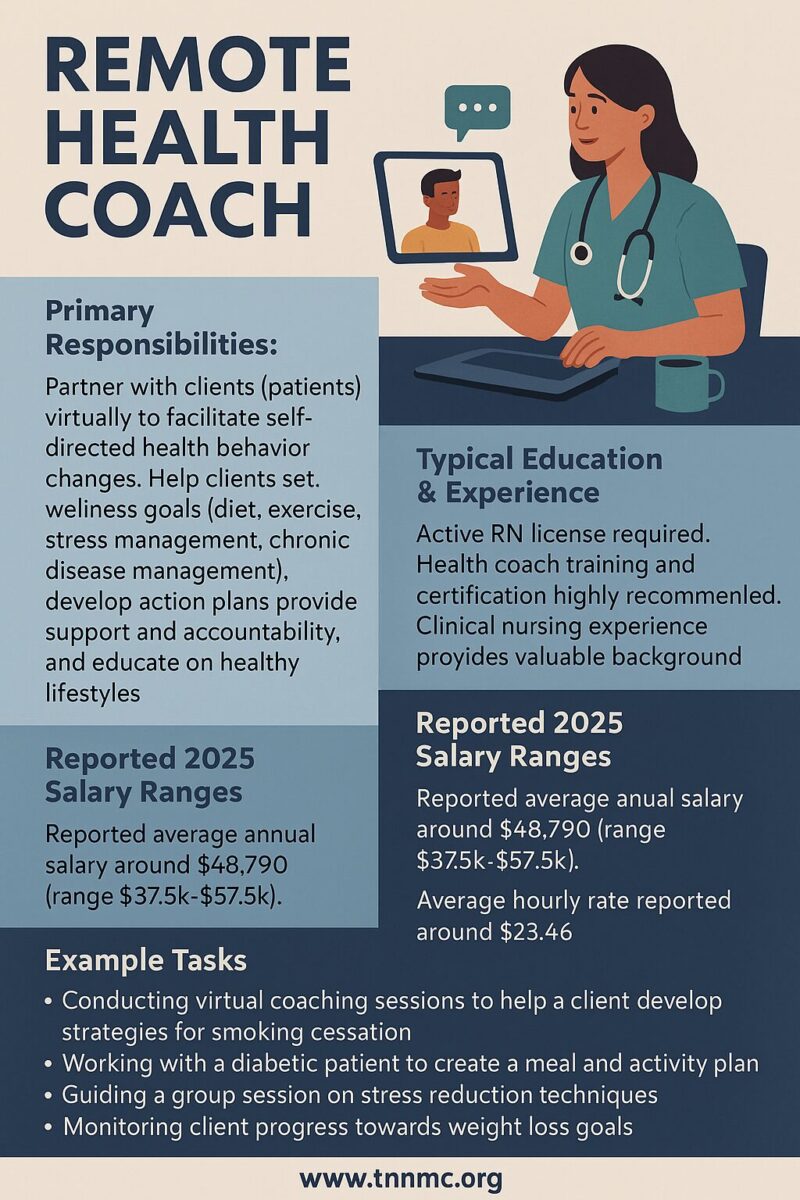
7. Medical Coder/Biller (with Nursing Background)
- Primary Responsibilities: Utilize clinical knowledge to accurately interpret patient medical records and assign standardized codes (ICD-10, CPT, HCPCS) for diagnoses, treatments, and procedures. Ensure coding accuracy for proper billing and reimbursement. May also prepare and submit insurance claims and follow up on denials.
- Typical Education & Experience: While an RN license (ADN or BSN) provides strong clinical context, specific medical coding certification (e.g., CPC from AAPC, CCS from AHIMA) is typically required for coding roles. Proficiency in medical terminology, anatomy, physiology, and coding systems is essential.
- Reported 2025 Salary Ranges: Salaries vary. Some reports show average hourly rates around $20.89 ($43k annually), while general medical coder ranges are often cited between $49,000 and $74,000 annually. Nursing background combined with certification may command higher rates.
- Career Outlook & Advancement: Stable outlook (BLS projected growth for medical records specialists ~9% 2023-2033 cited). With experience and further certification, advancement to roles like coding auditor, coding manager, or Clinical Documentation Improvement (CDI) specialist is possible.
- Example Tasks: Reviewing a surgeon’s operative report to assign appropriate CPT and ICD-10 codes, ensuring diagnostic codes support the procedures billed, querying physicians for clarification on documentation, submitting coded claims to insurance payers electronically.
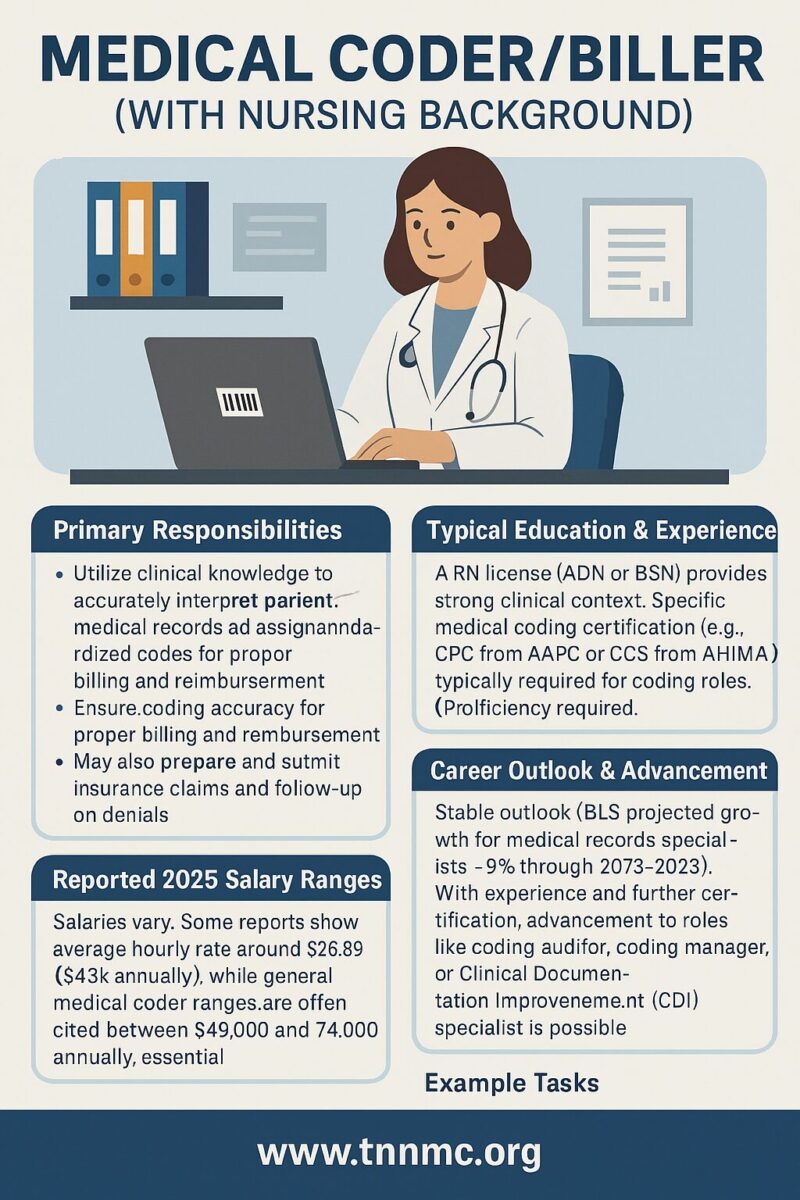
8. Nursing Informatics Specialist
- Primary Responsibilities: Bridge the gap between clinical practice and information technology. Design, implement, manage, and evaluate healthcare information systems (like EHRs and telehealth platforms). Train clinical staff, analyze data to improve care quality and workflow efficiency, manage IT projects, and contribute to IT policy development. Ensure data integrity and security.
- Typical Education & Experience: Active RN license and BSN typically required. Master’s degree in Nursing Informatics or a related field often preferred or required for advanced roles. Clinical nursing experience combined with IT aptitude/experience is crucial. Certification in Nursing Informatics (NI-BC) is highly valued.
- Reported 2025 Salary Ranges: Reported average annual salaries range from ~$91,282 (range $70k-$114k) to ~$102,099 (range $89k-$115k). Varies with education, experience, and scope of role.
- Career Outlook & Advancement: High demand driven by technology integration in healthcare (projected overall RN growth ~6% 2022-2032). Advancement paths include clinical informatics lead, consultant, project manager, or Chief Nursing Informatics Officer (CNIO).
- Example Tasks: Leading the implementation of a new EHR module for nursing documentation, training staff on a new telehealth platform, analyzing EHR data to identify trends in patient falls, developing workflows for remote patient monitoring data integration.
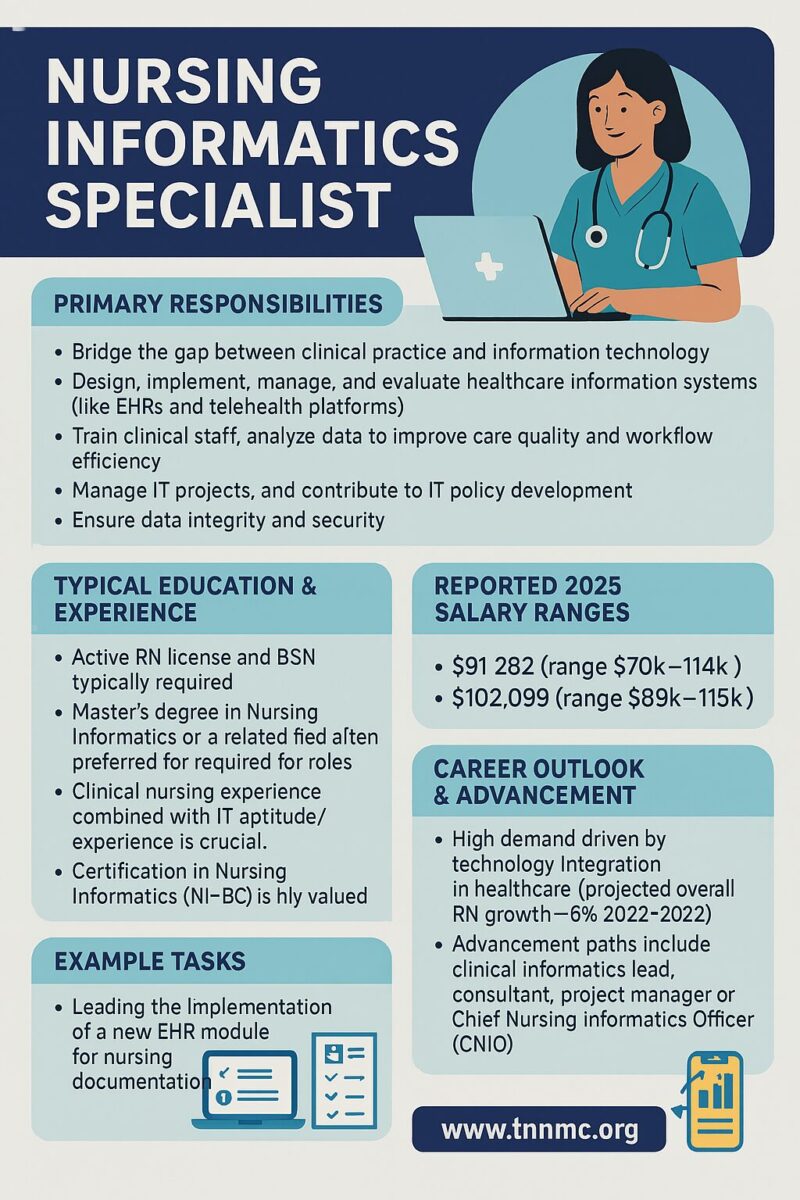
9. Medical Writer (Nurse Writer)
- Primary Responsibilities: Leverage clinical expertise to create accurate, clear, and engaging written content related to health, medicine, and nursing. Produce materials like patient education brochures, articles for professional journals, website content, regulatory documents, continuing education materials, or marketing copy for healthcare organizations or pharmaceutical companies. Requires interpreting complex information and tailoring it to the audience.
- Typical Education & Experience: Clinical background (RN with ADN or BSN preferred) is highly advantageous. Excellent writing, editing, research, and communication skills are paramount. While not always required, certifications (like MWC) or degrees in communications/journalism can be beneficial. A strong portfolio is essential.
- Reported 2025 Salary Ranges: Reported average annual salaries for nurse writers are around $81,000 – $87,590 (general medical writers reported range $63k-$111k). Highly variable based on experience, specialization, freelance vs. employed status, and client/employer type.
- Career Outlook & Advancement: Good outlook (projected growth for technical writers ~4-8% cited, varies by source/timeframe). Advancement involves building expertise in niche areas (e.g., oncology, regulatory writing), taking on editorial or management roles, or establishing a successful freelance business.
- Example Tasks: Writing patient-friendly guides on managing chronic conditions like heart failure, drafting an article for a nursing journal summarizing recent research findings, creating website content for a hospital service line, developing training materials for a new medical device, ensuring accurate portrayal of nursing in media content.
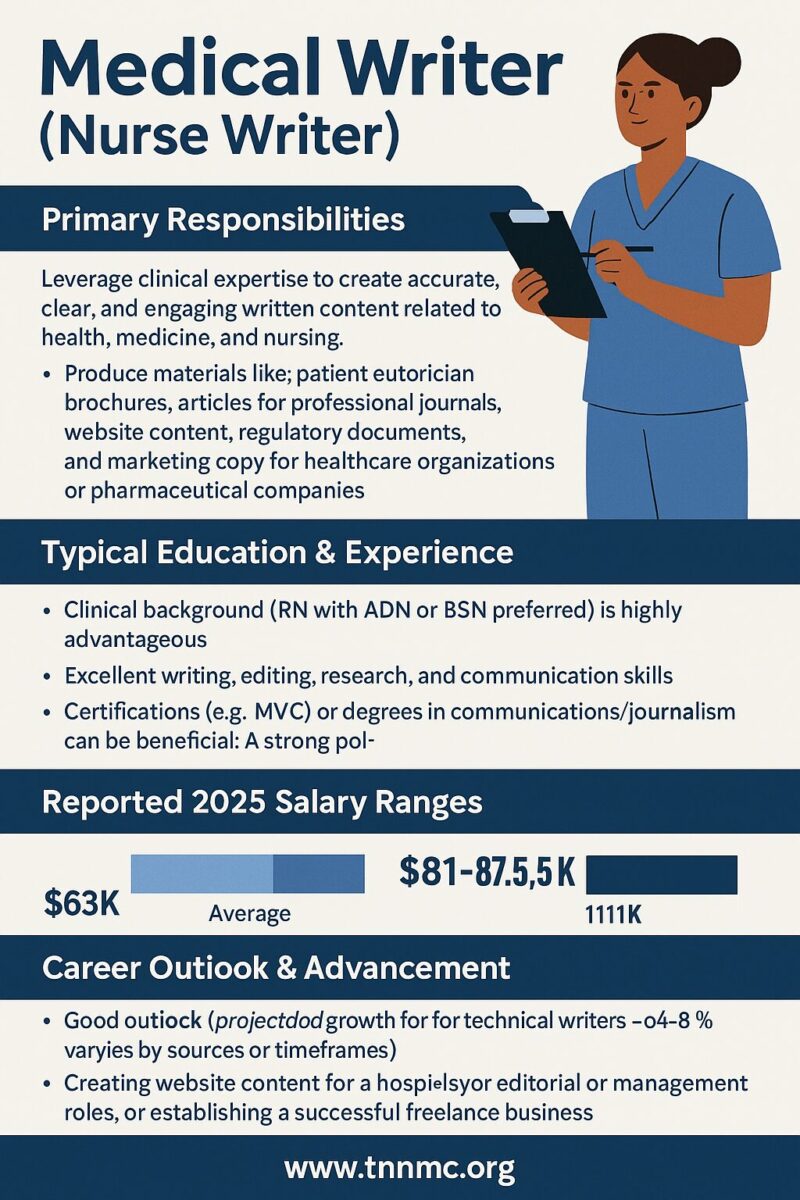
10. Clinical Research Coordinator (Nurse CRC)
- Primary Responsibilities: Manage key aspects of clinical trials. Recruit, screen, and enroll study participants; collect and manage study data; ensure adherence to protocols, ethical guidelines, and regulatory requirements (FDA, IRB). Coordinate patient visits, administer investigational products, monitor patient safety, and maintain meticulous records. Act as a liaison between investigators, sponsors, and participants.
- Typical Education & Experience: Active RN license (BSN often preferred). Clinical experience, often in acute care or a relevant specialty, is usually required. Certification as a CRC (e.g., CCRC via ACRP, CCRP via SOCRA) is highly valued and often preferred/required. Strong organizational and communication skills are critical.
- Reported 2025 Salary Ranges: Reported average annual salaries for nurse CRCs are around $71,500 – $76,518 (common range $69k-$86.5k). Depends on experience, location, and type of research institution (academic, hospital, pharma).
- Career Outlook & Advancement: Positive outlook with ongoing clinical research activity (projected job growth over 7% cited). Advancement can lead to roles like lead CRC, clinical research associate (monitor), project manager, or site manager.
- Example Tasks: Explaining a clinical trial protocol and obtaining informed consent from a potential participant, collecting blood samples and vital signs during study visits, accurately entering patient data into a clinical trial database, preparing for and participating in regulatory audits, educating patients on study medications and potential side effects.
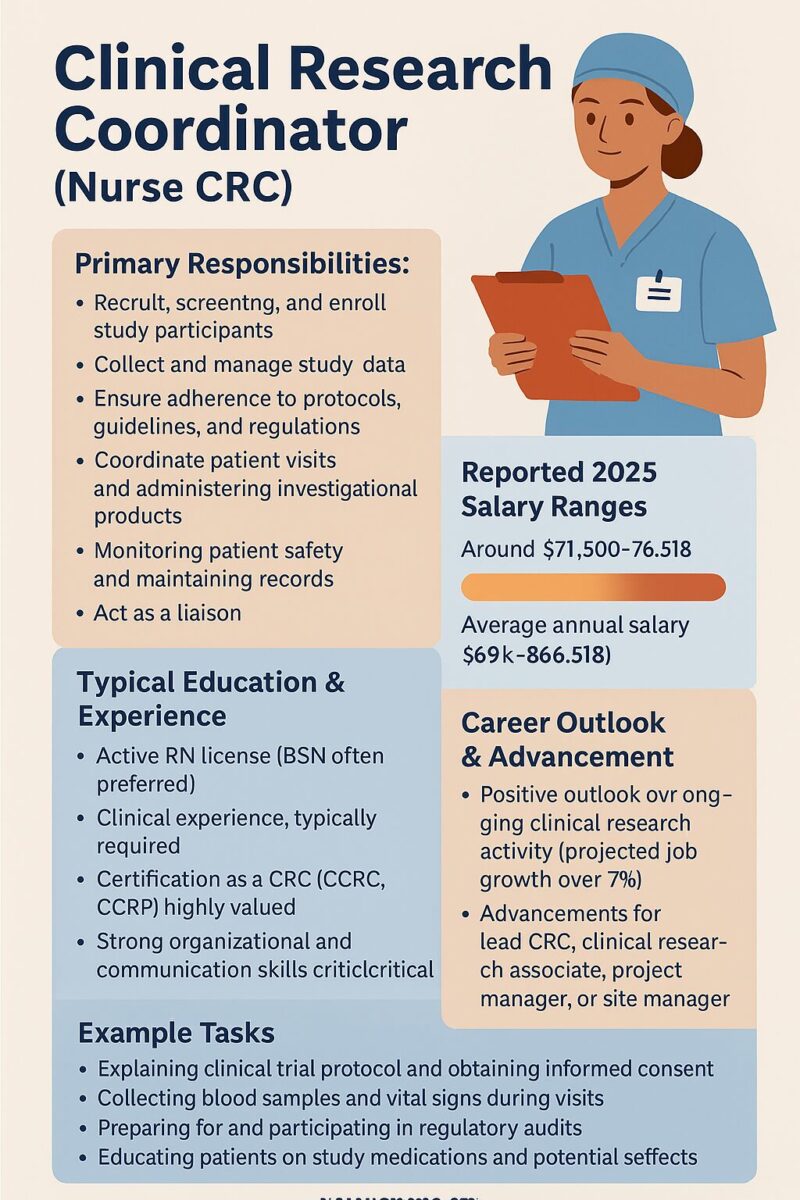
Essential Skills and Qualifications for Remote Success
Transitioning successfully to remote nursing requires a specific skill set beyond traditional clinical competencies:
- The Foundation: Clinical Experience: Most remote roles require a solid base of hands-on clinical experience (often 3-5+ years). This experience builds the critical thinking, assessment skills, and clinical judgment necessary to manage patient care effectively from a distance.
- Navigating the Virtual Workspace: Technology Proficiency: Comfort and competence with technology are non-negotiable. This includes:
- EHR Systems: Efficiently documenting care, retrieving information, and ensuring data accuracy.
- Telehealth Platforms: Using video conferencing, remote monitoring tools, and secure messaging systems effectively (experience with specific platforms like Epic, Zoom for Healthcare, Doxy.me is often preferred).
- Digital Communication Tools: Proficiency with email, chat, and other collaboration software.
- Security Awareness: Understanding and adhering to HIPAA and data privacy protocols.
- Bridging the Distance: Communication Excellence: Communicating effectively without face-to-face interaction is crucial. Key skills include:
- Active Listening: Fully understanding patient concerns through verbal cues.
- Clarity: Using plain language and avoiding jargon.
- Empathy & Rapport: Building trust and conveying compassion virtually (e.g., maintaining eye contact on video).
- Effective Questioning: Asking targeted questions to gather comprehensive information.
- Virtual Etiquette: Projecting professionalism and warmth in virtual interactions.
- Adaptability: Tailoring communication style to diverse patient needs and cultural backgrounds.
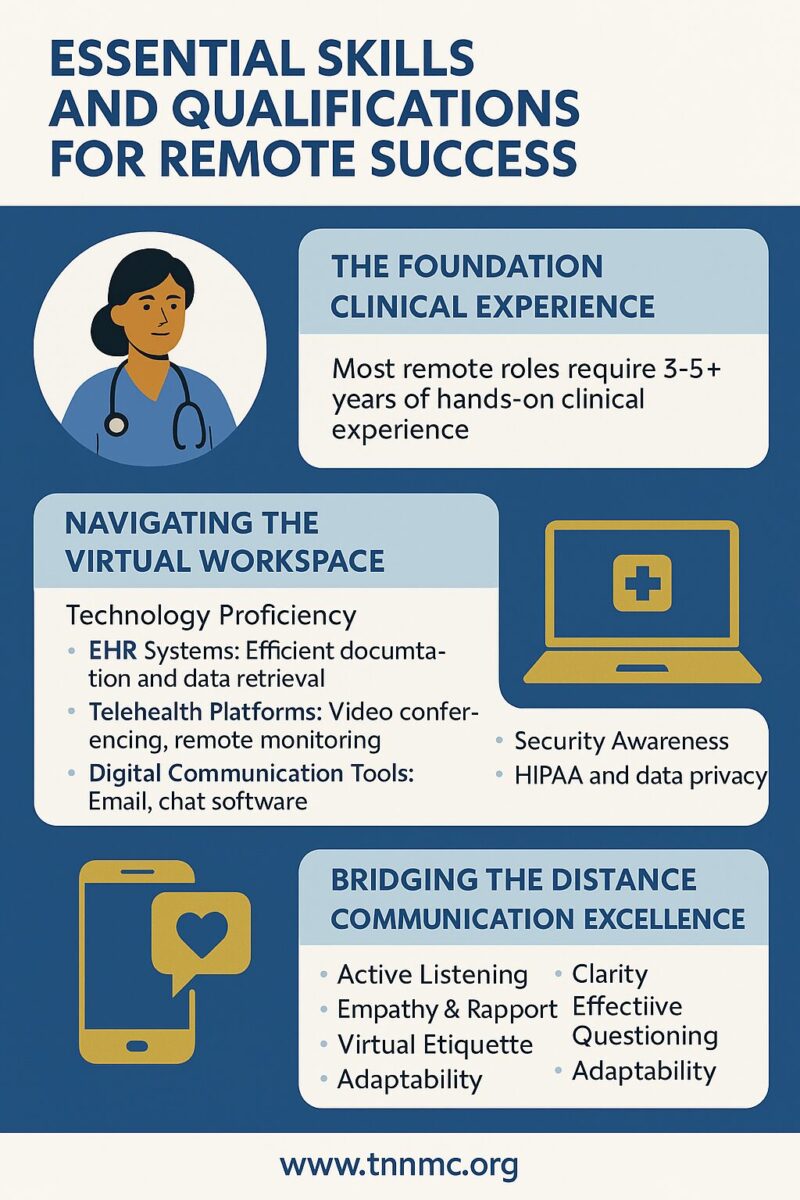
Licensing and Certification: Enabling Your Remote Practice
Navigating licensure and leveraging certifications are key steps for aspiring remote nurses.
- Practicing Across Borders: Interstate Licensing and the NLC: Providing care to patients in different states requires proper licensing. The Nurse Licensure Compact (NLC) allows nurses holding a multistate license (issued by their primary state of residence, if it’s an NLC member) to practice in other NLC member states without obtaining separate licenses. This significantly simplifies telehealth practice across state lines within the compact.
- Crucial Note: Nurses must always be licensed in the state where the patient is physically located at the time of care delivery.
- Nurses should verify if their home state is part of the NLC and understand the requirements for maintaining a multistate license. For practice in non-NLC states, nurses must investigate and comply with that specific state’s licensure requirements, which might include temporary licenses, reciprocity, or specific telehealth registrations.
- Enhancing Your Credentials: Valuable Professional Certifications: While an RN license is fundamental, specialized certifications demonstrate expertise and can significantly boost career prospects and earning potential in remote roles. Relevant certifications include:
- AMB-BC: Ambulatory Care Nursing Certification (valuable for many telehealth roles).
- CCM / CMGT-BC: Certified Case Manager / Nursing Case Management Certification (essential for case managers).
- NI-BC: Nursing Informatics Certification (key for informatics specialists).
- HCQM: Healthcare Quality and Management Certification (beneficial for utilization review/quality roles).
- CNE: Certified Nurse Educator (important for educators).
- Health Coach Certifications: (e.g., AHNCC, NSHC).
- Coding Certifications: (e.g., CPC, CCS).
- MWC: Medical Writer Certified.
- CCRC / CCRP / ACRP-CP: Clinical Research Coordinator / Professional certifications.
- Telehealth Facilitator Certificate: For those involved in the delivery process.
Pursuing certifications relevant to your target remote nursing specialty demonstrates commitment and specialized knowledge, making you a more competitive candidate.
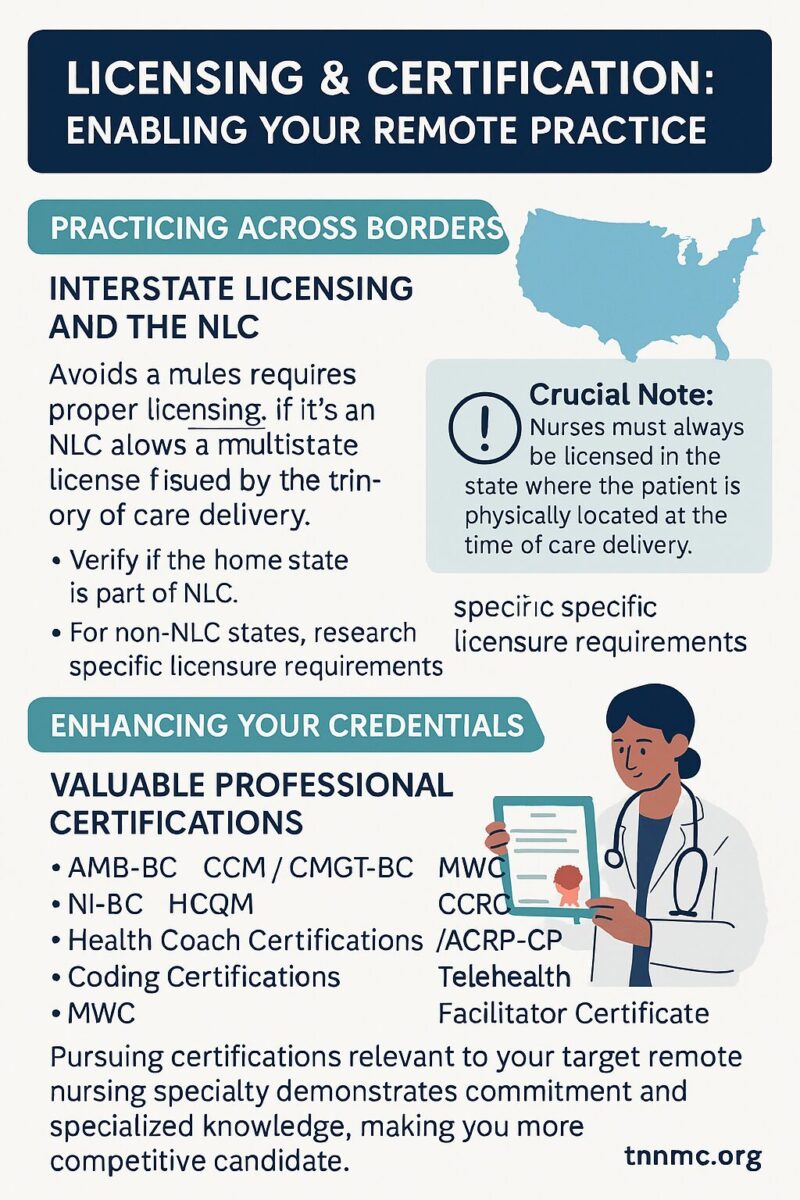
Conclusion
Remote nursing in 2025 represents a mature and rapidly expanding sector of the healthcare industry, offering diverse and rewarding career paths. Driven by technological innovation and sustained patient and provider acceptance of virtual care, the opportunities range from direct patient interaction via telehealth platforms to vital background roles in case management, informatics, education, research, and quality review.
Success in this field hinges on a strong foundation of clinical experience coupled with robust technology skills and exceptional virtual communication abilities. Understanding interstate licensure requirements, particularly the Nurse Licensure Compact, is essential for practicing across state lines, while targeted professional certifications can significantly enhance qualifications and career trajectory.
The remote nursing landscape offers compelling possibilities for nurses seeking innovative ways to apply their skills and achieve greater flexibility. Embracing continuous learning, adapting to technological advancements, and maintaining a steadfast commitment to quality patient care in the virtual environment will be key to thriving in this dynamic and impactful field.
Disclaimer: Information regarding job roles, responsibilities, required qualifications, and salary ranges is intended as a general guide based on reported data for 2025. Specific requirements and compensation can vary significantly. Always consult official sources and specific employer job postings for the most accurate and up-to-date details.
